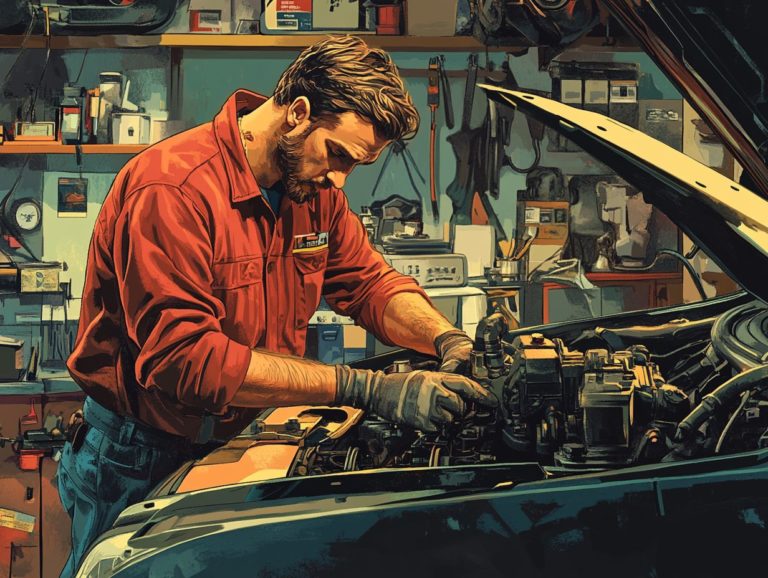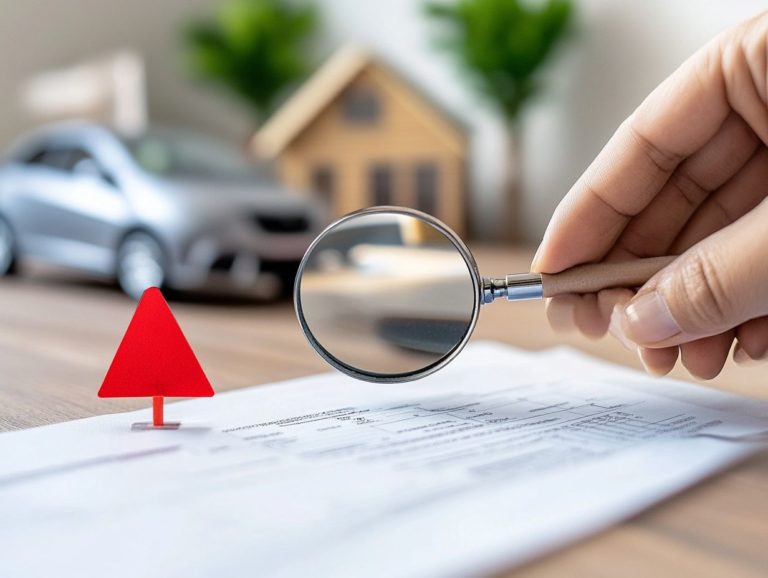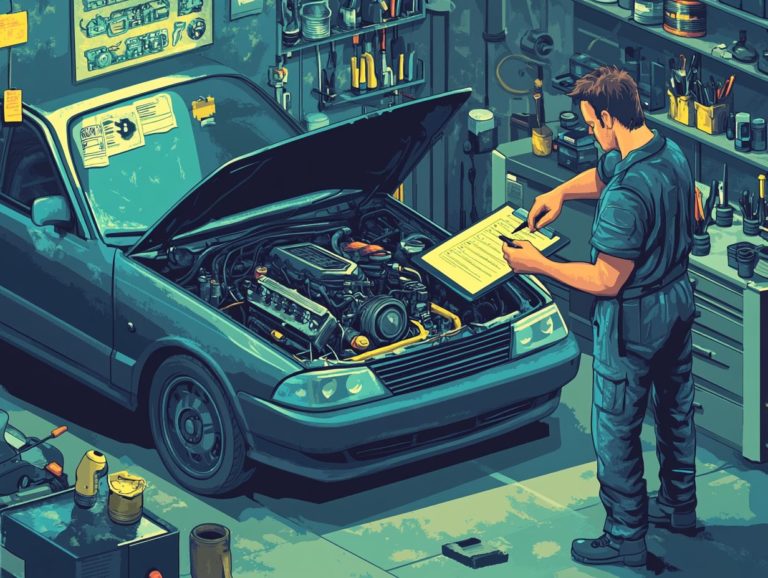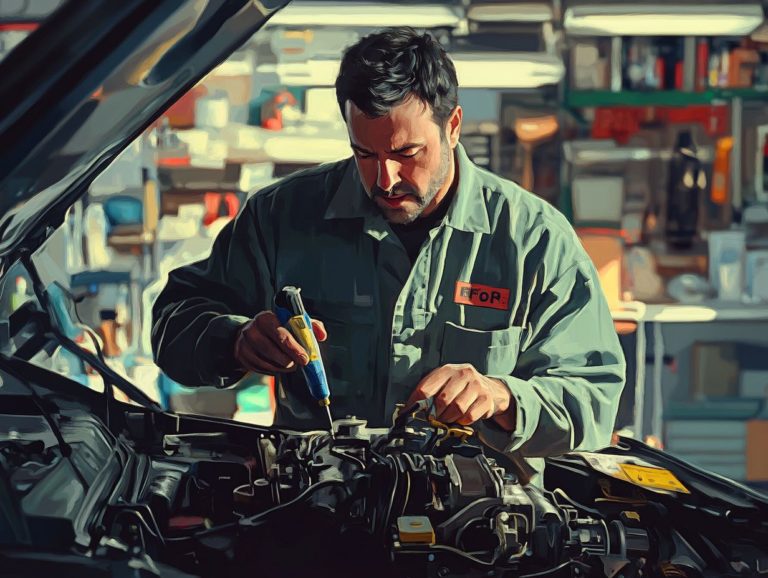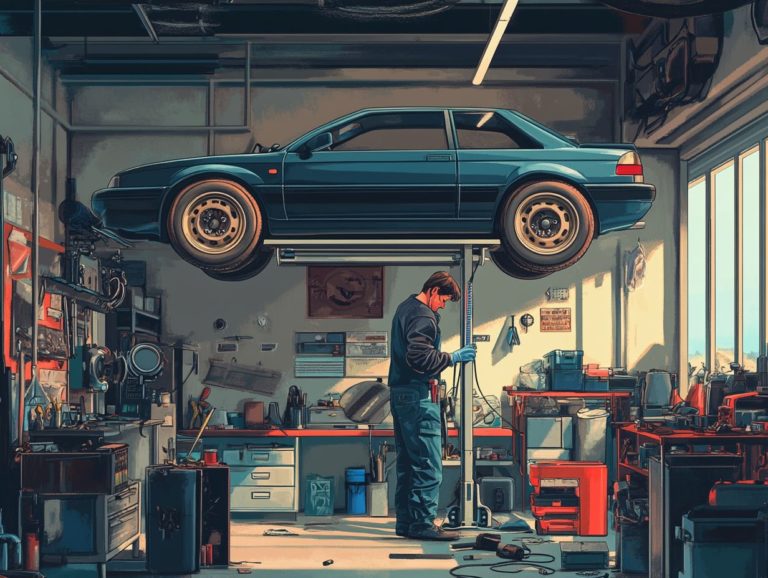When to Replace Your Car’s Air Filter
Your car’s air filter is essential for maintaining optimal engine performance and efficiency. Yet, it often remains overlooked until issues arise.
In this exploration, you’ll discover what an air filter is and why it holds such importance for your vehicle. You ll learn how to identify the signs of a dirty or clogged filter, when it s time for a replacement, and whether it’s best to handle the task yourself or bring in a professional.
You ll also get guidance on how to choose the right filter and tips to keep it in great shape. Jump in now to keep your car running smoothly and avoid unexpected breakdowns!
Contents
- Key Takeaways:
- Understanding Your Car’s Air Filter
- Signs that Your Air Filter Needs Replacing
- How Often Should You Replace Your Air Filter?
- DIY vs Professional Replacement
- Choosing the Right Air Filter for Your Car
- Tips for Maintaining a Clean Air Filter
- Frequently Asked Questions
- When should I replace my car’s air filter?
- How do I know if my car’s air filter needs to be replaced?
- What happens if I don’t replace my car’s air filter?
- Can I replace my car’s air filter myself?
- How much does it cost to replace a car’s air filter?
- Do I need to replace my car’s air filter every time I get an oil change?
Key Takeaways:
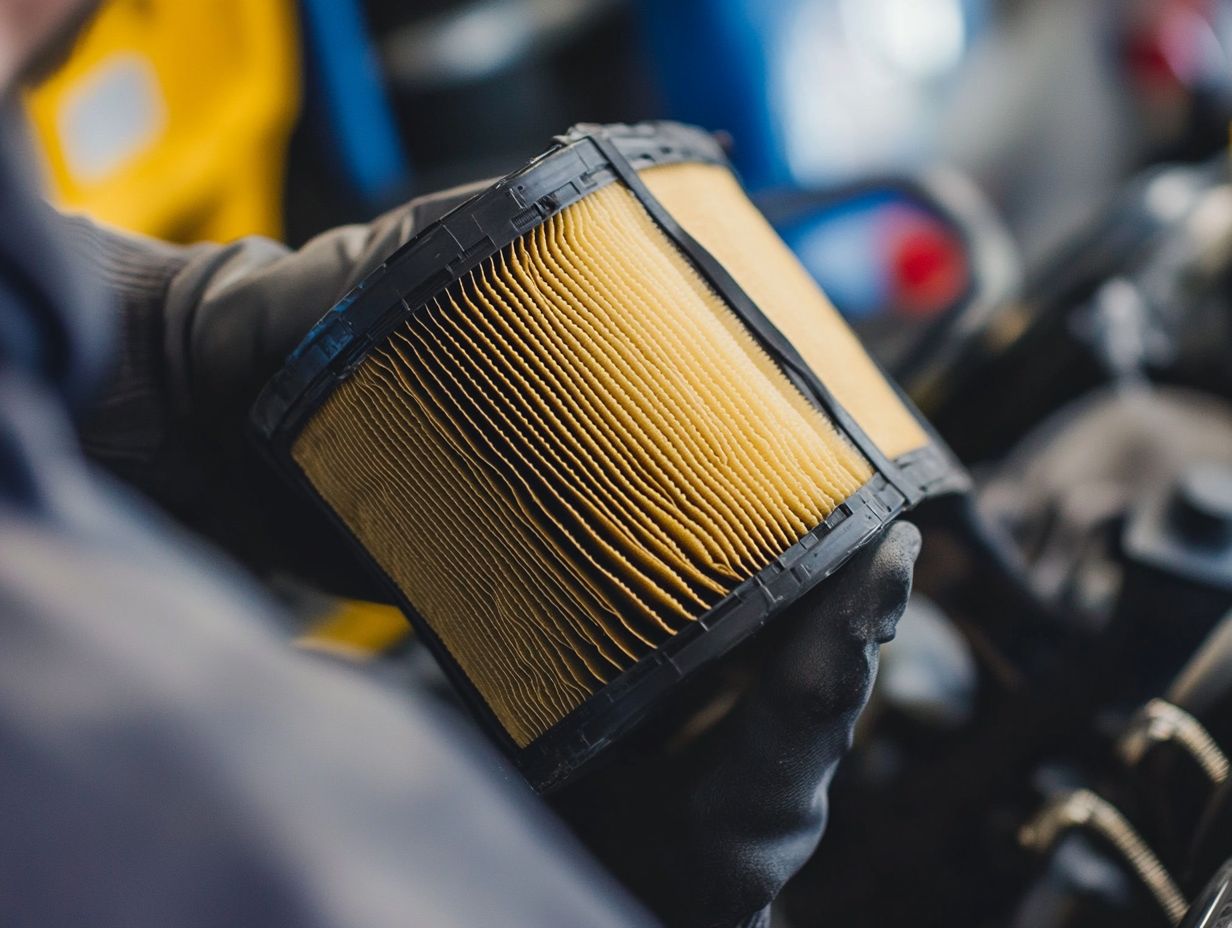
- Regularly replacing your car’s air filter keeps your engine running smoothly and efficiently.
- Watch for signs like reduced airflow and engine misfires to know when to replace it.
- Generally, change the air filter every 12,000-15,000 miles, but check your manufacturer s guidelines.
Understanding Your Car’s Air Filter
Understanding your car’s air filter is essential for maintaining peak performance and ensuring your vehicle’s reliability. This component plays a critical role in blocking contaminants like dirt and bugs from getting into your engine. Allowing such foreign materials to enter can lead to significant issues down the road.
By regularly checking and replacing the engine air filter, you can greatly improve your car’s efficiency and extend its lifespan. Keeping the air intake system clean helps you avoid expensive repairs and guarantees a smoother driving experience, whether you’re navigating the suburbs or embarking on a road trip.
What is an Air Filter and Why is it Important?
An air filter is a vital part of your vehicle’s engine. It is designed to remove dirt and debris from the air that goes into the part of the engine where air and fuel mix and burn. This simple yet essential component significantly contributes to maintaining engine efficiency and ensuring optimal combustion.
When the air filter is clean, your engine breathes easily, allowing for a seamless blend of air and fuel crucial for generating power. However, a clogged or dirty air filter can restrict airflow, leading to incomplete combustion and forcing the engine to work harder. This not only decreases fuel efficiency but also affects overall engine performance.
Regular upkeep of this critical component enhances your vehicle’s health and extends the engine’s lifespan. Thus, the air filter is an invaluable asset that deserves your attention.
Signs that Your Air Filter Needs Replacing
Recognizing the signs that your air filter needs replacing can save you from costly repairs and keep your vehicle running like a dream. Look out for these common indicators:
- The check engine light illuminating.
- Unusual sounds coming from the engine.
- Black smoke puffing from the exhaust.
- An odd gasoline smell.
- Signs of a misfiring engine.
- A noticeable drop in horsepower during acceleration.
Being attentive to these symptoms is essential for maintaining your vehicle’s performance and reliability.
Common Indicators of a Dirty or Clogged Air Filter
Watch for these signs that your air filter is dirty or clogged! You may notice an ever-present check engine light, engine misfires that you can t ignore, and a noticeable dip in horsepower when you hit the accelerator.
Alongside these red flags, you might experience a decline in fuel efficiency and peculiar engine noises, such as sputtering or increased strain while driving. When the air filter becomes excessively clogged, your engine struggles to pull in the essential air it needs. This leads to incomplete combustion, which not only triggers that pesky check engine light but can also elevate emissions levels.
You ll likely notice this scenario unfolding during high-demand situations like rapid acceleration or climbing steep hills when your engine craves a greater air supply to maintain peak performance. Ignoring this problem can set off a chain reaction that affects other engine components, resulting in costly repairs down the line. This underscores the necessity of routine maintenance to ensure your air filter is operating at its best.
Don’t wait until it’s too late check your air filter today!
How Often Should You Replace Your Air Filter?
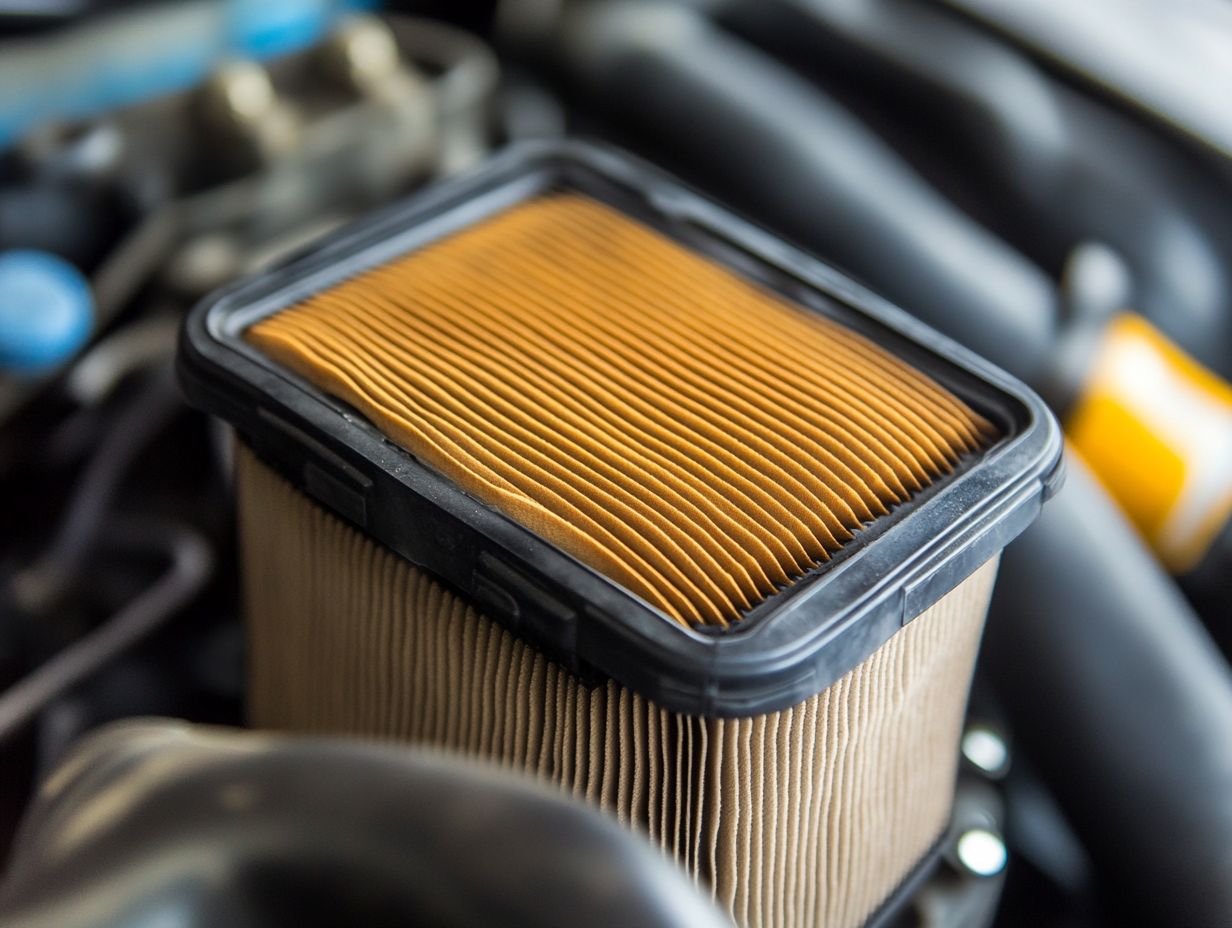
The frequency with which you should replace your air filter is primarily determined by regular maintenance schedules and the technical recommendations provided by manufacturers. Adhering to these guidelines is essential for ensuring your vehicle operates with optimal reliability.
Recommendations from Car Manufacturers
Car manufacturers generally recommend replacing your air filter every 15,000 to 30,000 miles. This can change based on your driving conditions and environment.
For example, if you primarily navigate urban areas teeming with heavy traffic and pollution, consider changing your filter more frequently. In such settings, the filter can become clogged more quickly due to elevated levels of dust and particulate matter.
On the flip side, if you re cruising through rural landscapes where the air is typically cleaner, you might find that you can stick to those longer intervals recommended by your vehicle s manufacturer.
Brands like Toyota and Honda highlight the importance of frequent checks in challenging environments. Check your filter every 5,000 miles to keep your engine in peak condition!
DIY vs Professional Replacement
When considering air filter replacement, you often find yourself weighing the options between tackling the task yourself and enlisting the expertise of professional services, such as those offered by mechanics or establishments like Jiffy Lube.
Pros and Cons of Each Option
The DIY approach to replacing air filters not only saves you money but also provides a satisfying sense of accomplishment. However, opting for professional service brings the convenience of expert assistance.
When you embrace the do-it-yourself route, you can reap significant financial benefits since buying a filter is often much cheaper than hiring a technician. The satisfaction that arises from successfully completing this task can greatly enhance your sense of homeownership.
Yet, without the right technical know-how, the risk of incorrect installation looms large. This could potentially compromise your air quality.
Conversely, choosing professional service ensures you benefit from specialized expertise, guaranteeing that the installation is carried out correctly and efficiently. This convenience often has a higher price.
It may also involve scheduling challenges that could disrupt your daily routine.
Choosing the Right Air Filter for Your Car
Selecting the ideal air filter for your car requires a clear understanding of several key factors and an awareness of the various types of filters available on the market. It’s not merely a matter of picking any filter; it’s about ensuring that you choose one that aligns perfectly with your vehicle’s needs and performance standards.
Factors to Consider and Types of Filters Available
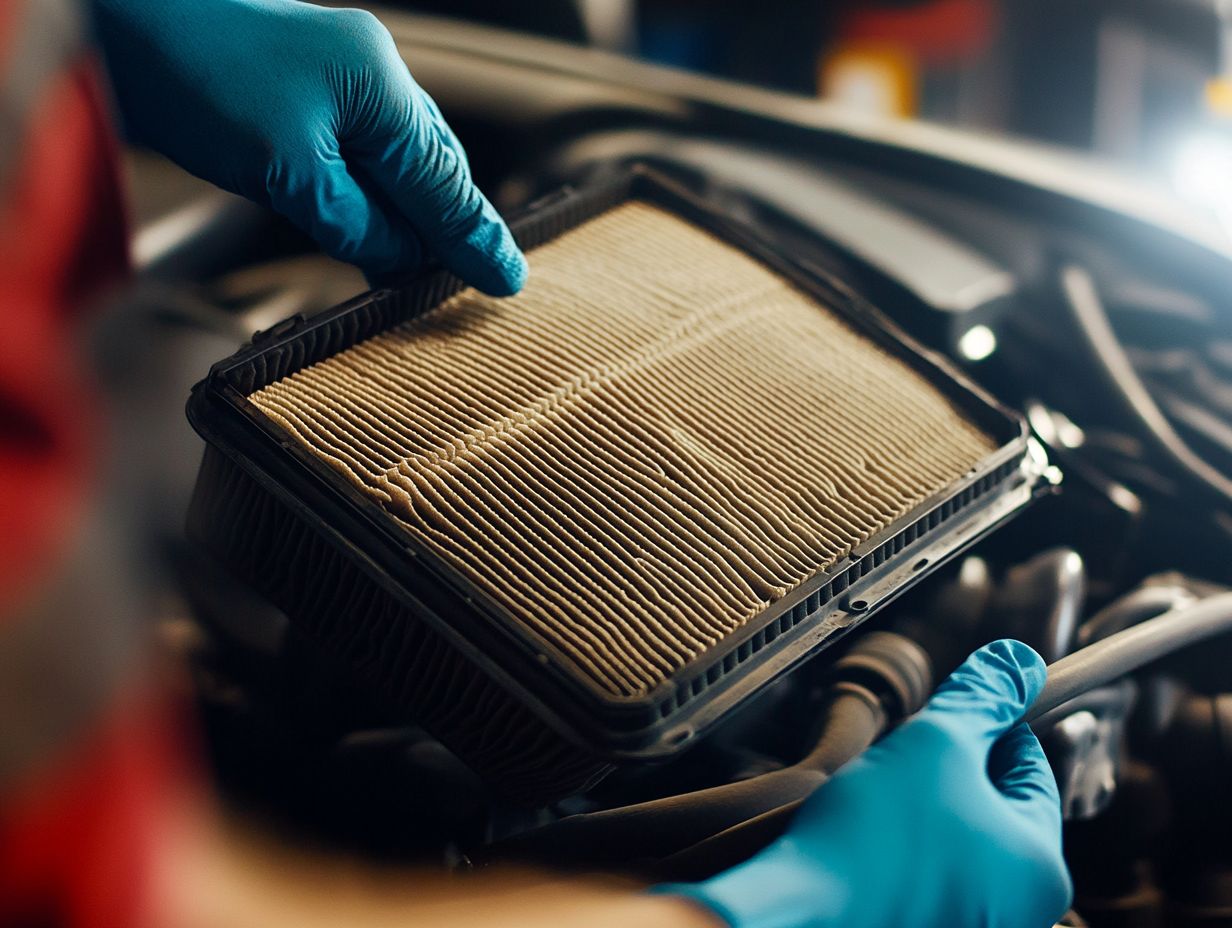
When selecting an air filter, it s essential to consider factors such as your engine type and driving conditions. The variety of filters available ranges from standard to high-performance options.
Standard filters, typically made from paper, are often more than adequate for everyday driving in moderate climates. They provide reliable filtration without creating significant airflow restrictions.
On the other hand, high-performance filters, often crafted from synthetic materials or foam, can enhance airflow and boost horsepower especially if you tend to drive with a bit more enthusiasm or face extreme conditions.
However, these filters may require more frequent maintenance and can sometimes compromise filtration efficiency. This can potentially allow contaminants into the engine.
Understanding these trade-offs empowers you to make the best choice for your driving needs!
Tips for Maintaining a Clean Air Filter
Maintaining a clean air filter is crucial for ensuring optimal engine performance. Consider several effective preventive maintenance tips to keep your engine running smoothly.
Ways to Extend the Lifespan of Your Air Filter
To extend the lifespan of your air filter, implement regular maintenance tasks that consider your specific driving environment, as it significantly impacts filter performance.
Routinely inspect the air filter for dirt and debris to ensure airflow and efficiency remain at their peak. Cleaning methods like compressed air or a vacuum can effectively eliminate buildup. Being aware of your driving conditions, whether heavy traffic or dusty roads, allows you to create a tailored maintenance schedule.
If you’re often stuck in stop-and-go traffic, check your filter more frequently than if you primarily drive on the highway. Paying attention to these factors is vital for enhancing the filter’s longevity and ensuring your engine runs smoothly. This ultimately saves you money and improves your vehicle’s overall performance.
Frequently Asked Questions
When should I replace my car’s air filter?
Make it a point to replace your car’s air filter every 12,000 to 15,000 miles or every 12 months, whichever comes first. Additionally, it’s important to know when to replace your car’s timing belt, especially if you frequently drive on dirt roads or in dusty areas, as this may indicate a need for more frequent maintenance.
How do I know if my car’s air filter needs to be replaced?
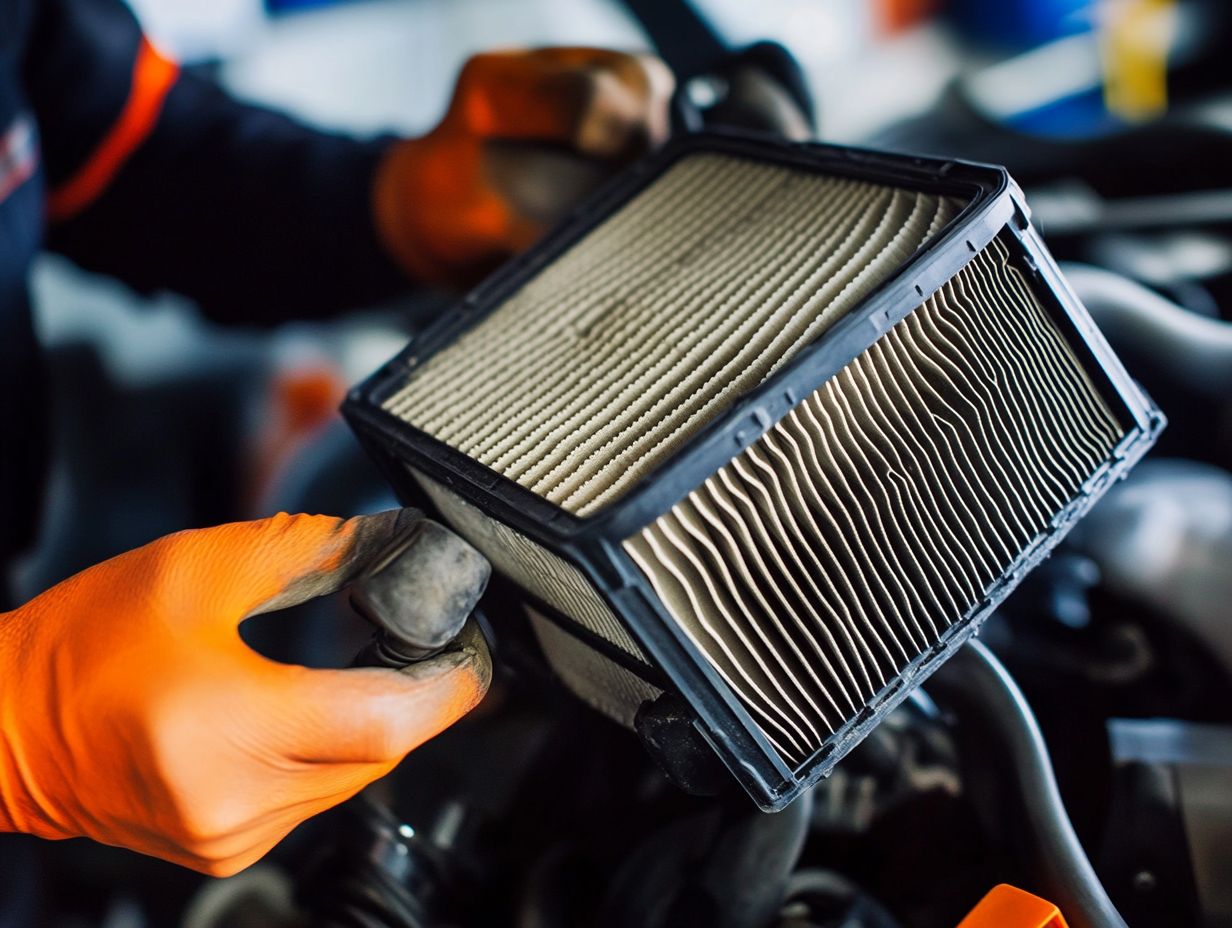
If your car is experiencing reduced fuel efficiency, a decrease in engine power, or a dirty cabin air filter, it may be time to replace your car’s air filter. You can also check the filter visually for dirt and debris buildup.
What happens if I don’t replace my car’s air filter?
If you don’t replace your car’s air filter, it can become blocked with dirt and debris, restricting air flow to your engine. This can lead to reduced fuel efficiency, decreased engine power, and potential engine damage over time.
Can I replace my car’s air filter myself?
Yes! Replacing your car’s air filter is a simple and affordable DIY task. Purchase a replacement filter at any auto parts store and follow the instructions in your car’s manual to replace it.
How much does it cost to replace a car’s air filter?
The cost of replacing a car’s air filter can vary depending on the make and model of your car and the type of filter you choose. On average, expect to pay between $15 and $50 for a new air filter.
Do I need to replace my car’s air filter every time I get an oil change?
No, you do not need to replace your car’s air filter every time you get an oil change. However, it is wise to check the filter periodically and replace it when necessary to ensure optimal engine performance.
Don’t wait too long! Check your air filter today for a smoother ride!

